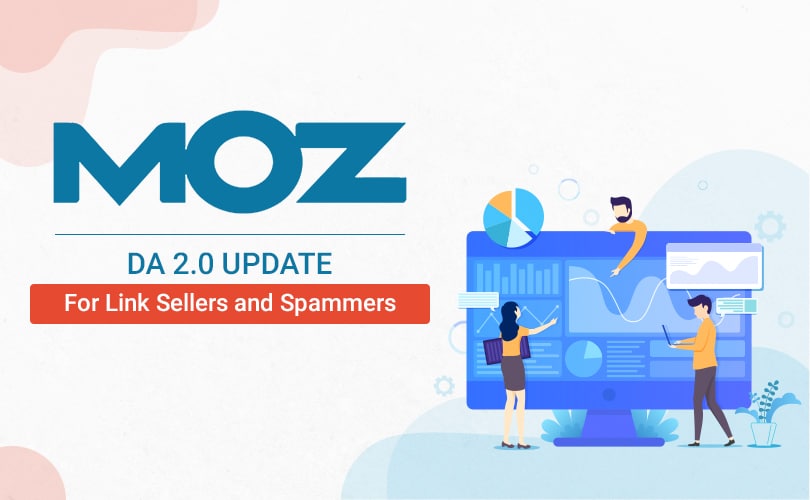Learn More About the MOZ DA 2.0 Update, Including its Impact on Link Sellers and Spammers

Domain Authority (DA) is a powerful search engine ranking tool that’s been used by digital marketers and marketing teams for years. In March of 2019, Moz (the SaaS company behind Domain Authority) announced a significant update to their popular SEO domain metric called DA 2.0. According to Moz, this algorithmic update “includes a number of new factors that make this score even more accurate, trustworthy, and predictive than ever before.” This update spells bad news for spammers and link sellers around the globe, and will probably disrupt normal paid link traffic for a while as well. In the long run, though, DA 2.0 should prove to be an even more helpful tool to those who lead and manage SEO efforts for their respective organizations.
MOZ DA 2.0 gives predictive ranking scores for domains, and it operates based on machine learning algorithms. Essentially, the higher a domain’s score on the 0-100 scale, the better its chances to get ranked on a Search Engine Result Page (SERP). It’s also important to note that Domain Authority doesn’t cause search engine results, it’s merely a predictor of search engine results. Moz has no direct ties to Google or any other search engine, and DA is not an official ranking factor. Rather, DA is a proprietary metric that predicts the likelihood that one domain will outrank another.
After the DA 2.0 update, we’ve seen some pretty drastic changes in the Domain Authority scores of many websites – some domains have seen their cores rise significantly, while the scores for other domains have really plummeted.
Below are a couple screenshots depicting how much some domain DA scores have changed (names have been blurred to protect the identity of each):
Hopefully, the above images give you some idea about how significant the impact of this DA 2.0 update is for organizations who are hoping to see their domains get ranked. According to a recent Moz blog, DA 2.0 has the strongest correlations with SERPs of the competing strength-of-domain link-based metrics in the industry.
SEO Strategy Tweaks You Should Make for Moz DA 2.0
Many SEO experts and marketers have made note of the wide variation in DA scores after the 2.0 update. If your particular domain score has dropped, one cause may be too many random inbound links from untrusted sources or spam sites. If you want to boost your score back up again, start by making sure you’re creating high-quality backlinks from the most trusted and relevant websites to your industry or organization niche. Try to stay away from random or bizarre link sellers, as this will typically result in a decrease of your domain score. Another tried-and-true strategy is to generate as many organic links as possible, through publishing your own original, valuable content. This should serve to help boost your DA score, and will improve your overall search rankings, too.
Now, let’s take a look at how this DA 2.0 update is affecting link buyers, sellers, and comment spammers.
Impact of Moz DA 2.0 on Link Buyers: -15.9%
According to the Moz blog referenced above, link buyers lost 15.9% of their Domain Authority. This change in score wasn’t as drastic as some, which seems reasonable given the parameters. Moz looked specifically at domains which regularly buy links from blog networks, which aren’t as “spammy” as some other techniques. Many of the sites who pay for links are also intentional about optimizing their content and site structure, so these sites do tend to rank well in Google and other search engine results. For these reasons, it makes sense that link buyers’ scores wouldn’t be affected as greatly as other categories, since some link-buying strategies are effective for improving SERP rankings.
Impact of Moz DA 2.0 on Comment Spammers: -34%
Websites which use a comment spamming strategy for getting backlinks have been affected by the Moz DA 2.0 update to a greater extent, to the tune of a 34% drop in their average Domain Authority score. Credible SEO strategists and consultants will be happy to see these results, as this should help to weed out more of those who stoop to comment spamming methods. A Moz representative stated that one of their goals with this update was to help decrease the volume of comment spam, and it seems that their efforts are indeed helping in that regard.
Impact of Moz DA 2.0 on Link Sellers: -56%
Some of the biggest losers with the Moz DA 2.0 update are those in the link seller category – their DA scores dropped by an average of 56% after the 2.0 update!
It is generally understood that many link sellers operate under a scheme where they interlink their own blog networks in order to build up Domain Authority scores. You’ll see in the screenshot below how one link seller tries to market the benefits of the inflated Domain Authority scores they’re able to provide.
As you can see, they are able to raise their rates based on the Domain Authority score they’re able to provide with their backlinks. Or at least, that’s how their shtick has worked up until now.
The reality is that many link sellers tend to have sites containing flimsy content and bogus link profiles. They don’t do much to optimize their own sites beyond their linking efforts. Because of this, these sites already rank poorly on Google and other search engines. The workaround for these link sellers up to this point has been in their effort to “work the system” to try and generate inflated DA scores. Thanks to the Moz DA 2.0 update, it now appears that link sellers are going to have a much tougher time doing that. The stock of many link sellers is likely to continue to diminish dramatically, if they don’t do anything to change their practices.
Conclusion
Needless to say, it will be interesting to see how the SEO market will continue to respond to the changes in Domain Authority scoring that have come about thanks to the Moz DA 2.0 update. The tables really should turn in the favor of honest content marketers who are working to produce digital content that is original, authentic, and relevant to the target markets of the businesses and organizations they serve.
Need some help in achieving your content marketing and SEO goals? The team of professionals at Cibirix is here to help!
About Author

Richa Mukati
Richa Mukati serves Cibirix as a Brand and Content Strategist, where she’s passionate about how creative concepts and targeted marketing messages can create positive, game-changing images for our business clients among their intended audiences. How does Richa help make this happen? She wields a crisp, compelling business sense that is backed by sharp, strategic thinking which aims for the target of meeting desired market success for our clients. Richa has extensive experience in marketing communication, and clients continue to seek her advice and trust her branding and content strategies which have resulted in measurable results. When not hard at work developing brand and content strategies, Richa enjoys meditating and binge reading.






